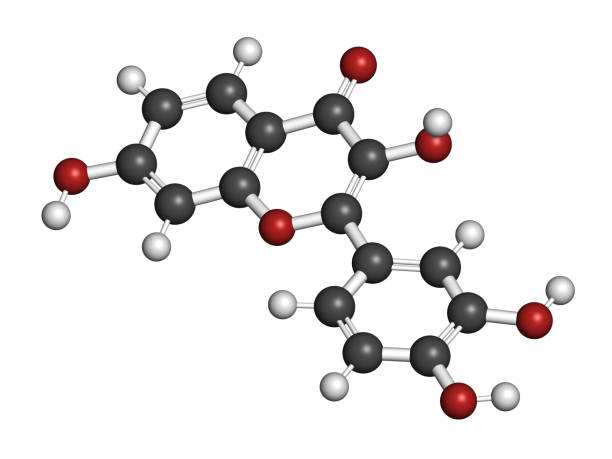Aceite de Oliva Virgen Extra - Cortijo La Muralla - Arbequina - Recolección...
(15,72 € / unidad)

Today we talk about polyphenols, natural chemical compounds found in many plants and therefore in products derived from them such as grapes, cocoa or olive oil; our protagonist.
These compounds have multiple health benefits due to their antioxidant and anti-inflammatory properties.
They play a fundamental role in protecting the olive fruit against environmental stressors and contribute to the distinctive flavors and aromas of olive oil.

Molécula de polifenol vegetal. Fuente: Istock
Olive oil is largely composed of polyphenols that contribute to the distinctive odor and flavor of the oil.
In nature there is a wide variety of compounds that present a molecular structure characterized by the presence of one or more phenolic rings.
These compounds can be called polyphenols. They originate mainly in plants, which synthesize them in large quantities as a product of their secondary metabolism. Some are indispensable for plant physiological functions. Others are involved in defense functions in stress situations and various stimuli.
The main health benefits are:
1. Protection against cardiovascular diseases and obesity: there are numerous studies that corroborate the role of polyphenols present in extra virgin olive oil in preventing cardiovascular diseases and obesity, demonstrating their positive impact on health through the reduction of oxidative stress, improvement of the lipid profile, and regulation of body weight and intestinal microbiota.
2. Antidiabetic activity and blood pressure reduction: Their ability to improve insulin sensitivity, reduce oxidative stress and inflammation, together with their vasodilator and blood pressure modulating effect, make them essential components in the prevention and management of diabetes and hypertension.
3. Protection against neurodegenerative diseases: Polyphenols offer a wide range of neuroprotective benefits due to their antioxidant and anti-inflammatory properties.
4. Anticancer activity: Polyphenols have a wide range of mechanisms through which they can exert anticancer effects, including their antioxidant properties, modulation of the immune response and reduction of metastasis.
5. Protection against skin diseases: Polyphenols offer a wide range of skin health benefits due to their antioxidant, anti-inflammatory, photoprotective, cell repair and antimicrobial properties.
The production of extra virgin olive oil depends on multiple factors that influence the polyphenol content of the final oil. The most important variables are listed below:
1. Olive Variety: Some varieties, such as hojiblanca, naturally produce a higher amount of polyphenols compared to other varieties. Therefore, oils obtained from hojiblanca will have a higher phenolic content.
2. Olive Harvesting Time: The polyphenol content of the oil is directly related to the time the olives are harvested. Olives harvested when they are more mature have a lower phenolic content. Therefore, early harvesting is crucial to maximize the presence of these compounds in the oil.
3. Agronomic Regime: The type of crop also affects the polyphenol content. Oils produced from rainfed olive groves have higher polyphenol content than those from irrigated groves. In addition, plantations at altitude tend to produce oils with higher levels of polyphenols compared to those located at sea level.
4. Harvesting and Production Conditions: To maximize polyphenol content, it is essential to use fresh, healthy, freshly harvested olives. Production techniques at the mill such as cold extraction, short shakes and low water centrifugation are crucial, as these conditions minimize the loss of polyphenols due to oxidation and water solubilization.
5. Conservation conditions: Maintaining the polyphenol content of the oil requires proper conservation. It is essential to avoid contact of the oil with oxygen, high temperatures and light. To this end, it is advisable to minimize racking, use full stainless steel tanks, and control the temperature in the oil mill.
6. Elimination of Impurities: To preserve the bioactive compounds in extra virgin olive oils, it is vital to eliminate moisture and suspended particles. This is achieved by proper decanting, correct centrifugation and regular purging of the tanks. Filtering the oil also helps to almost completely eliminate these impurities.

The olive varieties noted for their high polyphenol content are:
1. Hojiblanca: Grown mainly in Andalusia, Hojiblanca offers an oil with a very varied flavor profile. Its fruity and herbal notes, combined with a moderate bitterness and a spicy touch, are due to its considerable polyphenol content, which also gives it good stability.
2. Arbequina: Although traditionally known for its mildness, Arbequina can have a significant polyphenol content, especially when harvested early. Originally from Catalonia, this oil is smooth and sweet, with notes of ripe fruit and almond, making it an excellent choice for those who prefer a less intense but healthy oil.
3. Picual: The Picual variety, originally from Andalusia, is recognized worldwide not only for being the most cultivated, but also for its exceptional polyphenol content. This oil has a strong, bitter taste, with distinctive notes of olive leaf, fig and tomato. Its high oxidative stability makes it an ideal choice for cooking at high temperatures.
4. Cornicabra: Mainly grown in Castilla-La Mancha, Cornicabra stands out for its balance and high polyphenol content. Its oil offers a complex sensory profile, combining intense fruitiness with bitterness and spiciness, making it perfect for dressing salads and cold dishes. Choosing an extra virgin olive oil from any of these varieties not only guarantees a high quality product, but also a rich source of polyphenols, thus contributing to a healthier diet.
If you are interested in knowing more about this topic, we recommend you to read this other article of our blog about oleocanthal.
(15,72 € / unidad)
Hola, usamos cookies para personalizar publi y contenidos y ofrecerte todas esas cosas en Redes Sociales que te encantan, aunque en realidad esto te da igual. Puedes leer más aquí o hacer clic en OK para deshacerte de esta caja molesta y seguir a lo tuyo.
